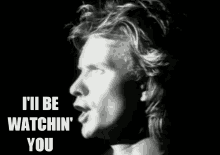I am amazed at how many folks have tracker apps on their spouses phones so that they know at every moment of the day where the hubby or wife is (or their phones, anyway). Having raised teenagers I could envision such a use for the kids' phones but I wonder why it is so important to know where your spouse is -- unless, of course, you are suspicious of them and do not trust them.
There are also tattletale apps so that your spouse is informed when you use a debit card or credit card in a joint account or login to Netflix or social media or a host of other things. Again, I can well imagine how useful this is if you have trust issues with those people but I am not exactly sure it is helpful to a relationship when one or the other is constantly checking up on the other.
We have gotten to such a place where we trust our police so little we insist upon reviewing everything they do with body cams and car cams and neighbors on smart phones. Sometimes this is helpful but too often the camera does not see everything and cannot answer every question we have. Plus the camera is without emotion and is detached from what it actually happening. Police tell us that we were not there. And, for good or for ill, we were not. Judges and juries cannot establish fact but only make reasonable judgments of what they believe are the operative facts in determining guilt or innocence before the law.
While England and Europe has a different attitude than Americans traditionally have had toward cameras in the public venues, that might be changing as well. Every time there is a mass shooting or something hits the news in a negative way, we think we ought to have video on it. We have placed cameras all over to make sure we do not miss anything. Now more than ever, you are likely to be watched by traffic cameras -- largely placed there to substitute for police eyes to issue tickets to those who run red lights. How far are we willing to go with this? According to bills making the rounds in Washington, money is being readied to exponentially expand the cameras and automated law enforcement.
Let me admit here that I am not against everything. I have one of those camera doorbells to find out when we need to go to the door to retrieve a package -- we do not have that many surprise visitors. It is less to spy than a convenience. Neighbors, however, have organized those who have these devices into a group in which alerts are issued. Stranger on my porch, dog missing, stranger checked my car to see if it was locked, etc... I must admit I do not pay much attention to those alerts. Perhaps I would if the issue were next door. Some folks seem to be preoccupied by such things.
We reject the notion that there are divinely appointed laws we all are accountable to or that there is an all-seeing God who watches over us -- seeing everything -- but apparently we are becoming amenable to a nanny state in which laws are enforced by technology and not simply people authorized to do so. The danger is that, unlike God, the camera does not see motive nor does it see everything. Perhaps when safety and security are concerned, we offer a bit more leeway to the technology and allow more doors into the antiquated notion of privacy. That is why I am still unsure about cameras in church. I have asked those who video our services not to pan the congregation. A kid picking his nose or an adult nodding off is not the primary concern of why we video the service. Too much information is even less helpful than too little. But all of this does point out one curiosity. We don't believe all that much that God is watching but we are more and more at ease with others watching. Could it be that this is another reflection of our focus on the here and now and our spiritual but not religious worldview?

No comments:
Post a Comment